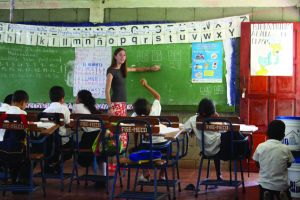Earning my global citizenship badge

Just before I left for Study-Service Term (SST) in Nicaragua this past summer, some of my friends got back from the spring Tanzania trip and were showing me their pictures. They had all the stereotypical Goshen College website pictures: hordes of cute kids, lots of dusty and shabby houses, brightly colored street scenes. It was making me really excited to leave. I knew the story. It was going to be really hard, but I would learn a lot, experience hospitality and, voila, I would come back a Global Citizen.
I figured if anything I was more prepared for SST than your average GC student. I’ve taken a decent amount of Spanish, am generally adaptable and am not very high maintenance. I’ve traveled a lot. I figured “roughing it” would be easy.
There were things, though, that were very difficult about SST, and they were surprising to me in their difficulty. The biggest learning experience for me was just day-to-day living in an entirely new place: it’s just so different from reading about it, looking at pictures on the Internet or even traveling. I am just used to an easy life – there is no way around it.
Some parts of my time in Nicaragua were just hard for me. Despite my above-average language skills, there were times when I was just lonely, sick of Spanish and wanted to be somewhere where things were comfortable for me like they often are in the United States. That was definitely a challenge. I was expecting to breeze right through that aspect of the cross-cultural experience all ready to take my Mennonite Central Committee post, or whatever I wanted, after college. This reminded me that I can not just adapt to wherever I am, on a whim. I have to work to live in a new place. This was difficult to learn, and I could not have done it without a three-month cross-cultural experience.
Not all lessons from SST have been so disappointing. Anything I could say about SST sounds so bland compared to what I experienced. There is no way to explain making real, dear friends with people who don’t even speak my primary language, playing hopscotch with all the women of my host family or learning new vocabulary from my 6-year-old students. One of the most influential lessons has been the realization that my host family, which doesn’t own half the stuff in my U.S. house, has everything they need and are happy with that. These are lessons that were so humbling, and that no amount of access to information or preparedness could teach me. I could not learn them any other way than by living them.
A few days ago I was looking at my pictures from SST. I noticed I had all the typical SST pictures just like everyone else, but I also saw that for me they’re more than just prerequisites for my global citizenship badge. They’re connected to memories that have changed me. I was affected by my experience in a way that was entirely surprising to me, and will continue to be affected for a very long time.
By Maria Byler ’10




